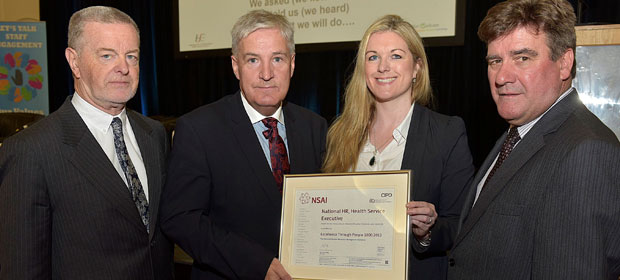Dr. Leandro Herrero presented an excellent and thought provoking paper where he gave high praise to the substance and aspirations of the HSE HR People Strategy, At the HSE HR Conference “Facing the Challenges, Embracing the Future”, at the Royal Hospital Kilmainham, Dublin in June writes Mary McCarthy.

However he suggested that its ultimate success or failure depended entirely on how the strategy is implemented. Dr. Herrero argued that what was needed now was a greater focus on critical thinking, creativity, communication and collaboration. Leandro highlighted the need to build a capacity to unlearn current understandings and re-learn and re-skill if we are to embrace the future with confidence.
Ambiguity rather than certainty is the new norm and has to be constantly navigated
These changes will challenge most of our taken-for-granted assumptions and require a paradigm shift on many fronts. According to Dr. Herrero the new vista has moved from independence to interdependence and from change management to changeability with change being the constant state. Ambiguity rather than certainty is the new norm and has to be constantly navigated. Resource sharing replaces resource ownership with an inherent loss of control. Terms in common usage such as best practice are less meaningful in this complex environment.
The HSE was established in 2005 and was heralded as a new structure that would improve and standardise health services at a national level. It promised efficiency through centralisation and economies of scale. What have senior HSE managers learned in the past decade or more? Has all the re-structuring improved matters? Have the Master Classes and Conferences and all the excellent learning translated into tangible benefits for patients? Have managers post conference become leaders fired with enthusiasm to find new ways to make life better for service users?
Or conversely, have years of repetitive and fairly meaningless process generated activity caused disempowerment, frustration and inertia and stifled our ambition to improve peoples’ lives? So much managerial time is spent on internal processes that simply serve the system itself, absorbing most of our work time. Most of this is necessary, but it is not, and cannot ever be, the core mission of the health system.
Retaining the status quo is ethically wrong and contrary to our own values and our mission as health service providers
The newspapers this week are reporting on waiting lists, citing National Treatment Purchase Fund statistics showing that in July 2016 there are 33,807 people waiting more than six months and 13,635 waiting more than 12 months for hospital procedures. This includes those waiting for surgery for scoliosis, which is a condition that causes increased curvature of the spine. For the small percentage that is progressive, it affects them severely. These children typically have back, rib and leg pain requiring regular analgesia and are challenged with schooling and sleep. Their breathing can be affected and they cannot digest normal amounts of food when internal organs become compressed. In Ireland we add people on the operating list when they reach a 68 degree curvature, while the international standard is 48 degrees. These young patients and parents need immediate support and a clear plan of action. It also makes practical sense in financial terms. The more these deformities increase, apart from the more important human cost, the damage will take longer to repair in the long run. Parents are left in a dilemma. Should they seek to take the option of the Treatment Abroad Scheme? If they take on the burden of taking children abroad for surgery (perhaps leaving siblings behind), there may not be the after-care when post surgery they get home, especially if complications emerge. In any event, these patients require regular monitoring by specialist orthopaedic teams and possibly more operations down the line as they get older their spine grows.
If the HSE as an organisation is unhappy that children with scoliosis are waiting for years on waiting lists then we need urgently to bring the stakeholders together to plan and activate a way forward. It‘s no longer enough to cite a scarcity of surgeons and specialist nurses, creative solutions must be found. How can we create a new narrative of ambition and invigorate the organisation so that the health system is fit for purpose now and into the future?
Firstly we need to acknowledge that we have major problems and learn that are not helpless to solve them. Retaining the status quo is ethically wrong and contrary to our own values and our mission as health service providers. According to the Cambridge English Dictionary a paradigm shift is a time when the usual and accepted way of doing or thinking about something changes. So when to start? If not now, when? What is impeding us from taking action?
Sincere thanks to Dr. Leandro Herrero www.viralchange.com thechalfontproject.com for inspiring this brief paper and also for proof reading the final copy.

